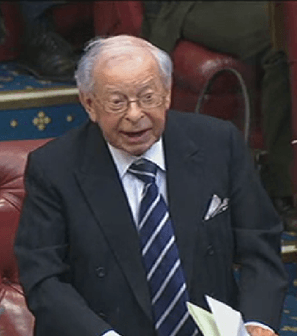Joel Barnett facts for kids
Quick facts for kids
The Lord Barnett
|
|
|---|---|

Barnett's last appearance at House of Lords questions.
|
|
| Chair of the Public Accounts Committee | |
| In office July 1979 – 9 June 1983 |
|
| Preceded by | Edward du Cann |
| Succeeded by | Robert Sheldon |
| Shadow Chief Secretary to the Treasury | |
| In office 4 May 1979 – 14 July 1979 |
|
| Leader | James Callaghan |
| Chief Secretary to the Treasury | |
| In office 5 March 1974 – 4 May 1979 |
|
| Prime Minister | Harold Wilson James Callaghan |
| Preceded by | Tom Boardman |
| Succeeded by | John Biffen |
| Member of Parliament for Heywood and Royton |
|
| In office 15 October 1964 – 9 June 1983 |
|
| Preceded by | Tony Leavey |
| Succeeded by | Constituency Abolished |
| Personal details | |
| Born | 14 October 1923 Manchester, England |
| Died | 1 November 2014 (aged 91) Manchester, England |
| Political party | Labour |
Joel Barnett, Baron Barnett, PC (born October 14, 1923 – died November 1, 2014) was an important British politician. He was a member of the Labour Party. As the Chief Secretary to the Treasury in the 1970s, he created the famous Barnett Formula. This formula helps decide how public money is shared across different parts of the United Kingdom.
Contents
Joel Barnett's Early Life and Career
Joel Barnett was born in Manchester, England. His father was a tailor. Joel went to school in Manchester and later became an accountant. Accountants help people and businesses manage their money.
He started his political career as a local councillor. He was elected to the Prestwich Borough Council from 1956 to 1959. This was his first step into public service.
In 1964, Joel Barnett became a Member of Parliament (MP). An MP is a person elected to represent a local area in the UK Parliament. He represented the area of Heywood and Royton. From 1966, he joined the Public Accounts Committee. This committee checks how the government spends money.
Helping Manage the UK's Money
From 1974 to 1979, Joel Barnett held a very important job. He was the Chief Secretary to the Treasury. This role is like being a top manager for the country's money. He worked closely with the Chancellor of the Exchequer, who is in charge of the UK's finances.
During this time, he became a member of the Cabinet in 1977. The Cabinet is a group of senior government ministers. They make important decisions for the country.
What is the Barnett Formula?
While he was Chief Secretary, Joel Barnett helped create the Barnett Formula. This formula is a way to share out public money. It decides how much money goes to Scotland, Wales, and Northern Ireland from the UK government.
He later joked that this formula gave him a strange kind of "immortality." It meant his name would always be remembered in politics. After the Scottish Parliament was created, he felt the formula was unfair to England. He thought it should be changed or stopped. He said this again in 2014, just before the Scottish independence referendum.
Later Career and Legacy
After his time as Chief Secretary, Joel Barnett continued to serve in Parliament. He was the Chairman of the Public Accounts Committee from 1979 to 1983. This meant he led the committee that checked government spending.
In 1982, he wrote a book called Inside the Treasury. It shared his experiences as Chief Secretary.
When his local area's parliamentary boundaries changed, he became a life peer. This meant he was given the title of Baron Barnett. He then became a member of the House of Lords. The House of Lords is the second chamber of the UK Parliament. Life peers are appointed for life and do not pass their title to their children.
In the House of Lords, he worked on various committees. These committees looked at important topics like the European Union and the economy.
From 1986 to 1993, he was the vice-chairman of the Board of Governors of the BBC. The BBC is the main public broadcasting service in the UK.
Joel Barnett passed away on November 1, 2014, at the age of 91. He is remembered for his long career in politics and for the Barnett Formula.
 | Sharif Bey |
 | Hale Woodruff |
 | Richmond Barthé |
 | Purvis Young |

